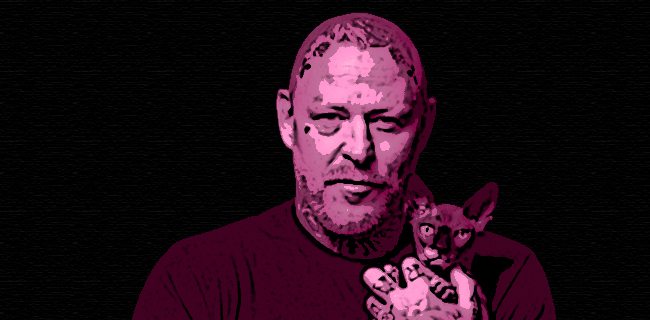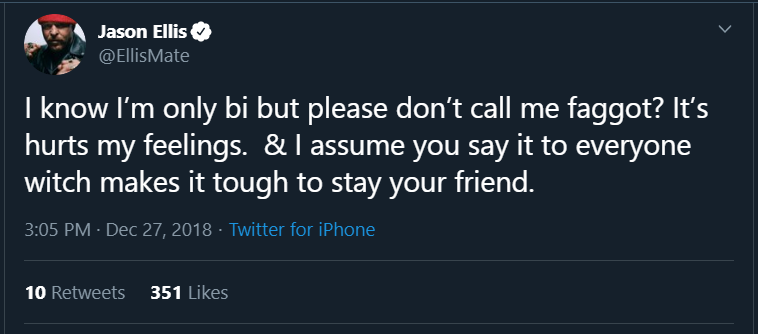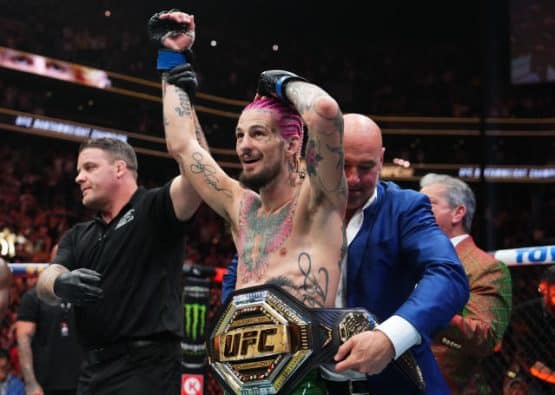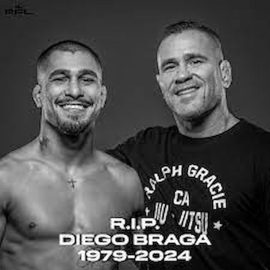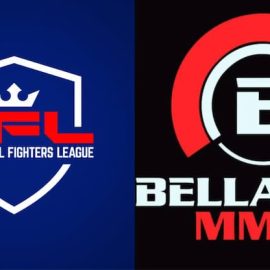In Jason Ellis’ latest book Still Awesome: The Trials and Tribulations of an Egotistical Maniac he mentioned his brief flirtation with heroin. He told me that once he reached the nadir of injecting the drug intravenously, his attitude completely changed.
“Well, I used to go and get really drunk and hang out with these hookers. They used to smoke heroin. So I’d buy their heroin and chase the dragon with them because I didn’t know how to get heroin – I didn’t know anybody. I wasn’t trying to tell anybody I was doing that either. It escalated and I got two hookers one night. I was like, ‘Fuck it, shoot me up,’ because I really didn’t care anymore. I was at rock bottom, I guess. That was it. Only one time. I had such a bad experience I never did it again. I never even smoked it again after that.”
“I started getting addicted to it when I was smoking it. I was smoking it on the weekends a lot and I’m like, ‘You know what, fuck it!’ So I did the thing that I always thought I’d never do. I really thought I’d never do that. It was so bad (laughs) that I was cured! It wasn’t just how bad I felt for doing heroin in my arm, it was being in a park on my own where you could totally get murdered. I had $800 in my wallet – those chicks took it. I was just sitting in the park like a fucking idiot. I knew it, I said it to myself, ‘Oh my god! You are as big of a loser as you ever could be.'”
“I was like, ‘fuck that! I am not going out like this! I’ve got to get my shit together.’ That got me motivated. Holy shit, what a loser!”
That ended that.
Pain has been a constant presence in Jason Ellis’ life. When he was performing acrobatics on the half-pipe as a professional skater, he embraced physical pain.
“I snapped my tailbone off. That was pretty bad. It was just floating in my arse. When I was really young, I broke my ribs and my forearm out of the back of my elbow. I pretty much just shattered my arm. It was worse because I think I was 16. Just seeing the bone come out of the back of my arm, that was not cool at all. There was a lot of shock involved. For me, I’m used to pain. Pain is bad, but shock is worse – the fear of death. In terms of straight-up pain, that one was real good. That one was right up there.”
“I skated pretty quick after that. I had a cast from my armpit to right across my knuckles. I was already skateboarding at the front of my Mum’s house after a couple of weeks. Within a month, I was skating vert (on a ramp) again just using one arm. I actually got better because once the cast came off, I still couldn’t straighten my arm and it was my front hand and that’s the hand you usually use to learn aerials on a half pipe. Instead I had to use my back hand for over six months. By the time my left hand got good again, it actually helped my skateboarding because I put in some work with the more difficult hand. I didn’t stop.”
A real fight
This trait became useful again when he found mixed martial arts. After joining Team Quest, California and training alongside legends such as Dan Henderson and Muhammed ‘King Mo’ Lawal, he became a professional MMA fighter.
Jason was unsatisfied with his pro debut, which he won by choking out his opponent in the second round. His fledgling MMA career began with a pristine record, but it was not enough to scratch the itch. In his own words, ‘seeing my own blood was a critical part of my dream fight.’
“I wanted a real fight, I wanted to take damage. I never really saw myself as a Floyd Mayweather – I don’t even really care. Maybe that’s why. I just wanted to have a war. I really wanted to see how tough I was. I mean, I know I’m not very good, I just wanted to see how tough I was. If you don’t take any damage, how can you tell?”
Eight years later, he got his wish in his sophomore MMA bout. This time, he took on a more formidable foe in the form of Gabe Rivas, a 40-fight veteran who had fought future UFC lightweight Chris Gruetzemacher and cult MMA personality Charles ‘Krazy Horse’ Bennett.
As Jason details in Still Awesome, co-written by Mike Tully, he took an absolute beating in the first round. There was so much one-way traffic that referee Mike Beltran admitted to him after the fight that he thought he was in trouble in the opening stanza. But Jason proved his toughness and forced the ref to end the bout in the third round. He left Beltran with no option but to step in after causing Rivas to emit a bloodcurdling scream with a submission hold called an ‘americana’.
The win was made all the more impressive by the fact that Jason was almost late for his own fight. Earlier that day, he made the podium in an off-road race which he described as ‘motocross with cars’. He conceded that taking part in both contests on the same day was an ‘iffy decision’.
While dealing with the physical pain had become second nature to him, emotional agony was a different beast altogether. When Beltran raised his hand to signify the victory, all Jason could think about was his little brother Stevie, who died tragically aged 24.
For a brief moment, he thought he was going to start crying.
“(Stevie) and his friends hot-wired a steamroller up in the mountains and they were knocking over posts on the side of the road. They ran over steel signs instead of the wooden posts and it tipped the steamroller off the cliff. It killed him instantly.”
“Since my brother passed away, I felt that he didn’t get to do what I did with all the opportunities that I had. He was very similar to me. The things I’m into, he was into. We liked Everlast. Everlast is my friend now because of the radio. My brother would flip out on that shit.”
“So I just try to do everything because he can’t. It’s like a switch ever since he passed away.”
This marked a stark contrast from his reaction to his professional MMA debut. On that occasion, all he could think about was his deceased father.
He didn’t think about his father this time. During the gap between his bouts, Jason had come to the horrible realisation that his father had sexually abused him as a child. His father had not been charged. Jason only unearthed the details of his abuses long after he passed away from a heart attack, aged 53.
Silence
When Jason first opened up about being sexually abused, he wasn’t cognizant of what he was doing. He was on such a potent gallimaufry of drugs that he began recounting the horrifying experiences to an imaginary friend. He only realized what had transpired at that party when his then-girlfriend told him the next day.
The abuse came to light again a few years later during a hypnotherapy session. When the therapist pressed him for more details, he found it extremely difficult to talk about. He cited a prior experience at a skate contest when he imbibed a little too much and disclosed this dark past to a fellow skater who, at the time he considered a friend.
After his companion reacted negatively with, ‘Why the fuck are you telling me that?’ Jason figured the best course of action would be to hold his tongue.
“I really did think about that one a lot. He didn’t really mean anything by it, but I had just realized it had happened to me and I didn’t know who else to tell. It was before I heard of therapists or anything. I was like, ‘Man, I guess I will just keep that one to myself.’ When you’re young you don’t realize that keeping things to yourself can make things more difficult for you in your life later on.”
“I didn’t know you had to get that stuff out. I was just like, ‘Shit, don’t tell anybody that again.’
“It’s just a part of growing up, I guess, but I’ve always felt that I didn’t fit in. ‘I don’t feel like I should have said that!’ I mean, that happened to me a lot when I was younger. It seems like some people get uncomfortable about things like that, so they react in a negative way. Then the person who talked about it is damaged a little bit. Depending on where you sit mentally, it can be a really hurtful thing.”
He could never hear the voice or see the face of his abuser in his memories. But he always remembered the penis. It wasn’t until he started doing MDMA therapy with a man called Dr Dan that he started putting the pieces together.
He relived the day it all stopped. He saw the heat lamp his father carried quickly disappear out the door as he held onto the springs under his bed with his toes and fingers screaming, ‘No, please stop!’
He never abused him again after that.
Jason eventually worked up the courage to reveal his father’s abuses on the Howard Stern show. Again, he felt that nobody close to him believed him. Again, he felt alone. Again, he felt like it would have been better if he just kept quiet.
“I regretted all of that because I don’t want to hurt my brother or my stepmom. It’s not their problem. He didn’t do it to them. If I just kept my mouth shut then they wouldn’t even have to contemplate that. It’s the same as being bi, if I keep my mouth shut, less people would have to deal with it, but I’ve found talking about the things that I’ve gone through makes it easier for me to exist. That’s how I live.”
“It’s different now. If I’m short-fused for some reason then I sit and think about things like that. It’s not their fault. It’s not the things they’ve said, the discussions they’ve had about it that may or may not have hurt my feelings. It’s not on purpose. It’s just like if they’re angry with me. I didn’t say this to make anybody angry. This is not the point. I’m trying to survive. I’m trying to get this thing out and figure it out. I don’t have any resentment towards any of them now, but originally, yeah. Especially at the time because I just figured out who I was.
“I just really needed somebody to be there and I had nobody.”
During an appearance on the Dr Drew podcast in 2016, Jason spoke more openly about his father’s abuse. He revealed that after his Dad died, he placed a note in his coffin apologising for being such a hard son to deal with. Now, he is no longer resentful of his father for making him feel like a ‘mistake’.
“I’ve got a lot of anger issues. I mean, take a look at me. You can definitely tell that I have been a bitter man in the past. I have to see past that now. I don’t think that (my father) had a good shot either. I don’t think that he was raised correctly at all. I think my grandfather was out of his fucking mind. He was kind of an angry, thinking about himself kind of guy. I am a lot like that and I know why, so I try to rectify that. I don’t want to die alone and angry or have a big surprise for a bunch of people when I pass away that nobody knew about. I’m not going to do that to anybody.”
Up until relatively recently, Jason’s sexual preferences would have come as a huge surprise to those who knew him. For most of his life, he kept the full truth about his sexuality hidden. Jason is bisexual. He has sex with women, men and transgender women.
For a long time, he had difficulty admitting this.
Even to himself.
“I didn’t come to terms with being bisexual. There were times when things might happen and immediately the next day I would just wipe it from my memory. I’d try to drink or just not think about it. Maybe subconsciously it was in there the whole time, but when I was younger, I didn’t think about it. If I did think about it, I’d cringe.”
Jason’s sexual encounters with men and transgender women often went hand-in-hand with other substances. When he was younger, he would sometimes take ‘tons of esctasy,’ head to Melbourne’s gay district and receive fellatio from drag queens in nightclub bathrooms.
In Still Awesome he also described ‘blacking out’ in Los Angeles a few years ago. When he came to his senses, he was shoeless, sockless, walking down the middle of the street carrying half a six-pack of alcopops. He wasn’t sure what he got up to that night, but he is ‘fairly certain’ he was with a transgender girl.
Jason had his first sexual encounter with a transgender woman at the age of 19. He met her at a dinner party in Australia which was also attended by some other members of the skating community. After taking ecstasy, they left together with all the discretion one might expect from two people coming up on ecstasy after an evening of drinking.
When he returned to his then-girlfriend’s house – they were in an open-relationship – there was another skater present who used the three-letter f word to Jason’s face. Jason froze, and that was the beginning of the Chinese whispers of his alleged homosexuality spreading throughout the skating community.
“People had told me before, ‘Hey man, I heard you’re a fag. If you were, that shit would be fucked up and I know you’re not, so don’t worry about it.'”
Back then, he knew he would not have been able to come out as bisexual. He felt the scene in that era was not as accepting of his alternative lifestyle.
“No, I don’t think that would have been a good move. In the end, when it came out with a couple of pros who knew that something had happened. There was a little bit of gossip. I was already moving back to Australia because of the gossip.”
“The anxiety of being at contests and having some of my friends and colleagues come up to me and say, ‘Hey man, somebody’s saying you’re a fag. That ain’t true, right?’ Those conversations put so much fear in my heart that I just didn’t enjoy competing anymore. My favorite thing was after the contest was to hang out in the hotel rooms and party with everybody and after that, I felt like I was hiding because I didn’t want to get caught in that conversation.”
He no longer holds any ill will towards those who whispered behind his back in the skate community. He doesn’t blame the skater for using the homosexual slur. He believes that way of thinking is a direct result of the environment in which he grew up.
“I’m not resentful of that anymore. I also know that it’s the way that people are raised, where they come from, your parents, people you looked up to, maybe your school or whatever… I don’t know who it is. But I know people are sheep. I feel like now, that very person, I’m still friends with him now and I’m pretty sure he knows that there’s something going on. I probably only see him two or three times a year, but if I see him before the year ends, he will shake my hand and look me in the eye. So I feel it was more of that was where he came from. People just say that, they don’t realize how hurtful that was. You know what, if I had admitted it and owned it, maybe I could have persuaded a lot of people to understand it, but I was nowhere near ready to say that.”
The main motivation for penning Still Awesome with Tully, the producer of his popular satellite radio show on SirusXM, was helping others. Unlike his first literary collaboration with Tully, the New York Times bestselling I’m Awesome: One Man’s Triumphant Quest to Become the Sweetest Dude Ever, the aim of this latest offering is partly to guide other members of LGBTQ+ community with their struggles with identity and acceptance.
“I think with the first book I always had this other part of me that I wasn’t sure about that I really hadn’t analysed. What I talk about on the radio all day is everything in my life – I don’t hide anything – and there was this one piece that I hadn’t talked about yet. The first book was like, ‘Look how many drugs he took and how many women he had sex with.’ It’s not exactly the full truth. The more I come to terms with myself, the more I’m like, ‘I should get this out there so nobody else who feels like me feels like they’re alone’. It’s really just to help a few people, because I know there’s not that many of us, but there’s still a lot more than anybody thinks, I believe.”
Jason’s story is one of success. He bounced back from the bad hand life dealt him. He was in and out of rehab since he was a teenager. There, he was diagnosed with depression as well as drug, alcohol and sex addictions before getting a grip on those too. He had two failed marriages before settling down to a happy union with his wife Katie. They both have a great relationship with Jason’s children Devin and Tiger.
“It’s therapeutic to talk about it. It’s therapeutic to know that people are going to read it. But most of it is just knowing that I’m in a position to help some people with some serious stuff. As a guy that doesn’t have much of an education, that kind of blows me away.”
“I’m a little bit addicted to trying to help people because I never thought I’d be in that position.”
Jason’s proudest creative outlet is Ellismania, an annual Las Vegas-based combat sports spectacle he founded where he puts his own health at risk for the baying masses. His most infamous appearance at the event may have been fighting former UFC interim heavyweight champion Shane Carwin in an exhibition boxing bout. Unfortunately, the modified rules which forced the man who had a famous two-round war with Brock Lesnar inside the Octagon to have his right hand duct-taped to his chest didn’t even the odds. Jason was flatlined by a left hook.
Getting rendered unconscious by a vaunted knockout artist on a public stage is just another way for Jason to bring joy to his supporters.
“The highlight (of my career) has been Ellismania. It sells out at the Hard Rock. Thousands of people all having the best time of their lives thanking me for it. I’ve felt like there was a couple of times there where I was like, ‘Look at you man. You fucking did it!'”
Jason was in the throes of depression after divorcing his second wife, Andrea. In terms of divorces, Jason described it as a ‘great one’. However, it was still brutal.
As someone who speaks every day to earn his crust, he regularly opens up about his personal woes on air. His listeners have a deep connection with this aspect of his show. Nothing illustrates this community spirit more than the fan who consoled him at the Hard Rock during the first Ellismania after he and Andrea separated. The fan only knew him as a radio personality, but he sympathized. He hugged Jason. They both wept in the middle of the hotel.
“Fuck yeah, I was shocked! It’s so weird because it’s a radio show where we talk about dick and fart jokes, but there had been many times where I had to do that show by myself. I poured my heart out in there. Everything I’ve got, I’m giving it to that radio show and sometimes it’s been emotional on there as well. For someone to respond like that, it is surprising, but if you really know the show and you really knew me at that particular time, it was pretty sad (laughs) and he really cared. I really care about him! I really care about all the people who listen to the show every day because I know why I get paid. It’s because of them. So I’m very grateful.”
The reaction to Still Awesome has been overwhelmingly positive for Jason. Ending the silence on his personal turmoil has resulted in an outpouring of support.
“Since the book was released, people have been really nice to me. Like the most ever in my life. Sometimes people still say stuff, but the word’s out that people know they can’t just say on social media, ‘Fuck you, you fag!’ (laughs) You can’t get away with that now. I think the new thing is, ‘that’s your deal, just keep it out of my face.’ Every now and then I hear that from people, but most of the time it’s just people in the shadows saying that. No one’s ever saying that to my face. I get it, everybody’s got their opinion.”
“I’m not worried about that anymore, I’m more worried about people like me who are 17 and not sure what they are. I hope that they hear me because it’s not bad. We shouldn’t feel ashamed of it.”
This has only encouraged him on his new quest – to help the voiceless speak up, to make the ashamed feel pride, to bring optimism to the hopeless, to make the isolated no longer feel alone and to deconstruct the fallacy of normality.
“If the LGBTQ community wants to have me involved more, I would love to be a part of that. Obviously, I want my show to keep growing, but I just want to be able to help people. I’m getting pretty pumped on that part of my career. I didn’t really see that coming. I’m just in a really cool position.”
RAINN (Rape, Abuse & Incest National Network): 800-656-HOPE (4673)
Department of Defense (DOD) Safe Helpline for Sexual Assault: (877) 995-5247
ChildHelp National Child Abuse Hotline: 1 (800) 422 -4453
National Drug Helpline: 1-844-289-0879
The Trevor Project (crisis intervention and suicide prevention services to LGBTQ young people ages 13-24): (866) 488-7386
National Suicide Prevention Lifeline: (800) 273-8255
The Gay, Lesbian, Bisexual and Transgender National Hotline: (888) 843-4564
Substance Abuse and Mental Health Services Administration (SAMHSA) Helpline: 1 (800) 662-4357
Add The Sports Daily to your Google News Feed!
